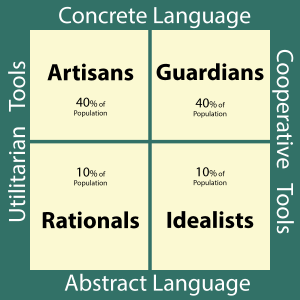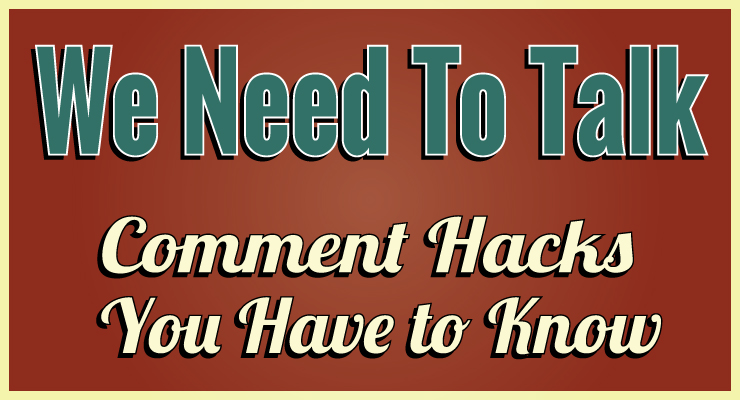“We need to talk,” she says. Oh Man, that can’t be good. Did I do something? Did I not do something? To be honest, I don’t remember. I think I’ve been pretty good about things lately, but you just never know. It’s usually when I think I’ve done well, that I find out I screwed up somewhere.
OK, so we’ll talk. Maybe it’s a good kind of talk. Maybe I did get it right and she just wants to thank me. Well, whatever it is, it’s sure to be a surprise. I know what I’ll do. If it’s bad, I’ll just apologize and agree with her. If it’s good, I’ll act like I meant to do it all along and agree with her. Alright, here goes…
Communication is always a tricky business, because it involves relationships. Think about it. You don’t communicate with people unless you have some sort of relationship with them. That means that communication brings with it all of the emotional, rational, and irrational elements of the various ways people interact.
When we communicate, there are just as many ways for us to misunderstand and upset each other as there are for us to encourage and help . It’s no wonder many of us shy away from communication, and limit our exposure to others (High Five! Introverts Unite!). However,
Know Yourself
In order to understand how you can best communicate with your audience, you must first understand yourself. This means taking a look at your personality. Do you tend to use Concrete or Abstract language? Are you Utilitarian or Cooperative when you use tools? Are you thoroughly confused at this point?
OK, let me explain. According to the research of Isabel Myers and Kathryn Briggs (based on the work of Swiss Physician, Carl Jung), there are four major personality types in the world. For the sake of brevity, I won’t get into what those types are in this article. For our purposes, it is enough to know that there are four.
Two of those personalities use Abstract language. This means that they tend to speak using symbols that point to images in the mind. The other two use Concrete language. This means that they tend to speak using signals that point to things the eye can see.
By the same token, two personalities are Utilitarian in their tool use. This means that they choose tools based mainly on their effectiveness and efficiency. The other two are Cooperative in their tool usage. This means that they choose tools that are accepted and approved by the people they work with.
Knowing how your personality naturally uses language and tools is key to creating content that the personalities of your audience will understand and appreciate.
Know Your Audience
 According David Keirsey (author of “Please Understand Me”) the four personality types are not evenly distributed throughout our population. There are two majority types that each represent about 40% of the population and two minority types that each represent about 10% of the population.
According David Keirsey (author of “Please Understand Me”) the four personality types are not evenly distributed throughout our population. There are two majority types that each represent about 40% of the population and two minority types that each represent about 10% of the population.
The Majority Types are Artisans and Guardians. Artisans are concrete in their language. This means that they will say what they mean in clear, seeable terms without metaphor or imagery. They will be resistant to absolute words like always and never because they know that things are rarely that extreme. Artisans are practical and pragmatic. They will also be quick to call you out if you share your opinion as though it is fact without supporting it with details or data.
Artisans are utilitarian in their tool usage. This means that they choose the most effective tool to accomplish their goal with the greatest efficiency. It’s also why they rely so heavily on data to prove performance. They are not concerned with what others think nearly as much as they are with getting what they want. To these folks, tools (which can be implements, politics, ideas, or even people) are things one uses to get a job done fast and well – nothing more.
Guardians are the other majority personality type. They are also concrete in their language. This means that 80% of the people who read your stuff are concrete language users, so clarity and practicality should almost always rule over artistry and symbolism when it comes to business blogging. Guardians, like their Artisan cousins, don’t like to wade through a lot of theory and heady supposing. They would rather you just give them what they came for whether that be tips & tricks, “how to” instructions, a product review, or whatever.
Guardians differ from Artisans, however, when it comes to tool usage. These folks are cooperative in this department. They get things done by working together with other people, therefore the opinions of their professional and personal networks are important to them. They love “Best Practices,” because they insure a productive and positive group effort by reducing conflict that may arise from questionable methodology.
When Guardians read your stuff, they’ll want to know that your ideas have social proof. Data is important as well. They certainly want to know that your approach works, but these people are even more concerned with knowing that your approach is approved by their peers. This is where Social Media likes and shares are absolutely essential.
There are two other types of personalities. They are Rationals (Abstract with language & Utilitarian with tools) and Idealists (Abstract with language and Cooperative with tools). However, since the two types together only make up 20% of the population, I’ll discuss them in another article.
Principles of Successful Discussion
Discussion is a two-way communication
Discussion is the only thing that separates the guy who writes a great blog from the guy who just talks to himself all the time. It is one of the true measurements of your blog’s effectiveness. If your stuff is informative, educational, and entertaining to others, they will tell you in their comments. And, if your stuff is controversial and upsetting to them, they’ll tell you that too. Just like any conversation we bloggers have to listen as well as speak. In fact, tomorrow I’ll tell you about 5 critical things you can learn from your comments.
When people leave comments, they risk rejection
Leaving a comment is like asking someone out on a date. There’s always the chance that you will be shot down, disappointed, and even ridiculed. When people leave comments, they are risking rejection and that isn’t a comfortable place for anyone. Keeping this fact in mind will help you to properly appreciate the comments you receive.
You must reward that risk by answering
When someone risks rejection by commenting on something you’ve written, always reward that risk by acknowledging their effort. Even if you don’t agree with the comment, remember that you are fortunate to have received it. Now you’re not just talking to yourself. Thank the commenter and acknowledge that their thought or question is valid and valuable. This will go a long way toward building rapport with your audience.
Relationships are built one answer at a time
Remember that businesses are built on relationships and relationships are built on communication. Each time you validate and appreciate a commenter, you are building a stronger relationship with your audience. Those relationships, more than anything else, are the keys to building a strong and vital business that will last and grow.
Hopefully, this article was helpful for understanding the importance of discussion in blogging. So often we focus on the writing aspect of what we do and forget that the listening is just as crucial. Diaries are for secrets and self-reflection. Blogs are for discussion and communication.
How do you handle comments on your blog? How valuable have those comments been to you personally as well as your business? Share a comment and let’s talk about it.

